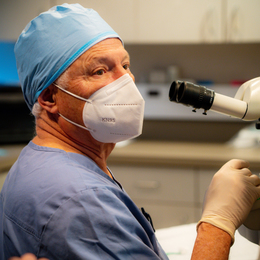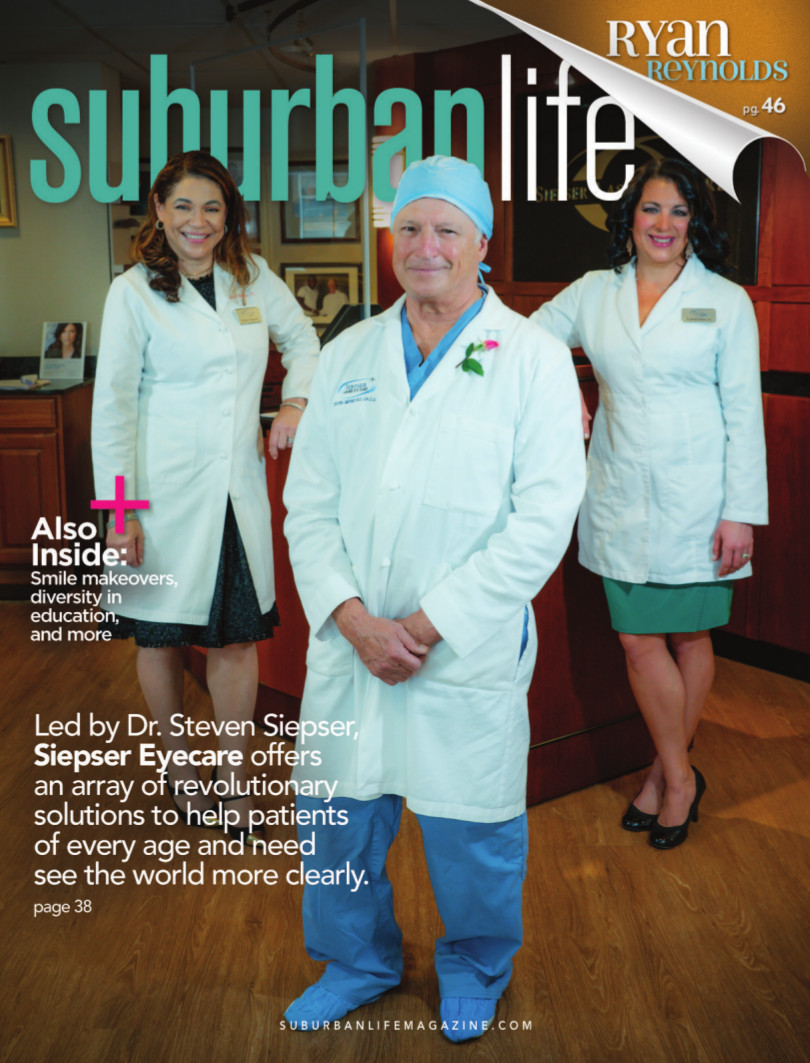
Visionary
Led by the inimitable Dr. Steven Siepser, Siepser Eyecare offers an array of revolutionary solutions to help patients of every age and need see the world more clearly.
His name may be synonymous with multiple aspects of eyecare, but Steven B. Siepser, M.D., FACS, is known throughout the country as a pioneer, inventor, and teacher.
“I had learned how to use an electron microscope doing research early in my college career,” Dr. Siepser says. “Microsurgery didn’t exist at the time, but I had this tremendous God-given skill in that I knew how to operate with a microscope at a time when few other surgeons did. I set up shop in Paoli, and at the time I was the only doctor in Chester County to use intraocular lenses [to improve patients’ vision]. … When laser vision correction came along, I was selected to be an FDA investigator to get the excimer laser approved for treating nearsightedness.”
Since then, Dr. Siepser has completed more than 35,000 procedures, including LASIK, intraocular lens cataract surgeries, and corneal transplants. His flourishing practice, Siepser Eyecare, has grown to include offices in Wayne and Plymouth Meeting, and several surgery centers throughout the area. The practice employs advanced technology to restore clear vision for patients affected by any number of eye-related challenges—namely, nearsightedness, farsightedness, astigmatism, cataracts, glaucoma, and dry eye, among others. He also teaches a technique known as the Siepser Sliding Slip Knot, which he invented, to fellow practitioners as a way to repair certain iris defects that had once been considered irreparable.
Patients of every age group and background, including physicians and other professionals whose livings depend on clarity of vision, routinely seek out his expertise. One example: Chad Lewis, former tight end for the Philadelphia Eagles, who caught the game-winning touchdown in the 2005 NFC Championship Game that led to the Eagles’ first Super Bowl appearance since 1980.
“Chad wore contact lenses but wasn’t seeing very well,” Dr. Siepser recalls. “He would say, ‘Sometimes when I turn, I lose the ball.’ His contacts were moving a little as he shifted his gaze. After he had laser vision correction, he had his best season ever.”
Compromised vision can affect every aspect of a person’s life—a golfer or tennis player who cannot see the ball well, a skeet shooter who can’t line up a shot, a lifelong reader who can no longer make out the words on the pages of a beloved book. Dr. Siepser, who is board certified in ophthalmology, believes many people choose to live with compromised vision because they incorrectly assume the medical community has no solution for their specific problem.
“At Siepser Eyecare, our team spends most of our time teaching the patient that what they think they know is wrong,” Dr. Siepser says. “I have patients that I performed laser correction 20 years ago and they still have clear vision without readers!”
Whereas the average person may spend $1,000 a year on glasses and contacts—figure $10,000 over a 10-year period—laser vision correction through Siepser Eyecare may cost as little as $4,500. Dr. Siepser describes the lasers he uses to perform the procedure as “extremely quick, accurate, and truly painless,” able to offer a life-changing result in less than 10 minutes.
“Contact lenses can cause corneal ulcers, infections, and all kinds of eye-related problems,” he adds. “All those issues can go away with laser vision correction.”
‘We Really Care’
Michele Pendrak, O.D., spent more than six years as a pediatric ophthalmologist before joining Siepser Eyecare in 2014. When she came aboard, Dr. Siepser tasked her with the challenge of founding and directing a center within the practice to help patients affected by dry eye, a condition caused by a lack of tear production or insufficient tear quality.
Patients afflicted with dry eye experience symptoms such as a stinging or burning sensation, light sensitivity, and the persistent feeling that something is in the eye. The roots of dry eye vary by patient, and may include meibomian gland dysfunction, systemic inflammation, and undiagnosed medical issues, as well as a number of environmental conditions.
“Some people might not have the quintessential dry-eye symptoms, but they have blurry vision caused by dry eye,” Dr. Pendrak says. “I’ve seen some patients go from 20/70 vision to 20/25 vision just by treating the evaporative component of dry eye. My role is to understand what caused it and where it came from, and then tailor a treatment plan to help the patient deal with it effectively.”
Dry eye may play a role in diagnosing and treating other eye-related conditions. As a result, Siepser Eyecare has begun adding dry-eye treatment as part of most surgical packages to correct refractive error. “A little pretreatment goes a long way,” as Dr. Pendrak says.
Rocio C. Pasion, O.D., joined Siepser Eyecare earlier this year after more than 20 years with her prior practice. A board-certified optometrist who specializes in primary care, Dr. Pasion treats eye-related conditions such as cataracts, diabetic retinopathy, and macular degeneration, as well as glaucoma, which has the potential to cause permanent blindness.
She says cutting-edge technology helps her give patients a clearer picture of their eyes’ anatomy and understand options to address their specific issues. By offering “a clear fingerprint and mapping” of the cornea and a histological view of the retina and macula, for example, Dr. Pasion and her colleagues can detect and resolve changes in the eye before the patient realizes a functional change in vision.
“We really care, and that’s what matters to me,” Dr. Pasion says. “Yes, we have all the latest technology here, but it’s how you use it to manage the patient’s condition and how you educate the patient along the way. We don’t just do LASIK on someone and say, ‘See you later.’ We want to be their surgeons for any future corrective needs.
“Dr. Siepser is by far one of the most skilled and caring physicians I have ever worked with,” she continues. “With him, it’s all about education. He’s the main reason I left a practice of 21 years.”
As Dr. Siepser reflects on his career and the practice he has built, he cherishes the idea that he has been able to help people who once believed they were beyond help.
“If a patient was told 10 years ago that nothing can be done, guess what: There may be something that can be done now,” he says. “You may be a CEO, an expert in your field, or otherwise someone who has accomplished a great deal in life, but you may not know what medicine has to offer. You never know if you don’t come in. Discover what is truly available.”
For more information on Siepser Eyecare, including services offered and its locations throughout the five-county area, call (610) 665-3277 or visit siepservision.com.
Photograph by Jody Robinson
Published (and copyrighted) in Suburban Life magazine, November 2020.



